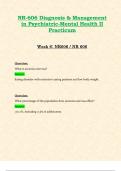NR-606 Diagnosis & Management in Psychiatric -Mental Health II Practicum Week 6 : NR606 / NR 606 Que stion: What is anorexia nervosa? Answer: Eating disorder with restrictive eating patterns and low body weight. Question: What percentage of the population does anorexia nervosa affect? Answer: 1 to 2%, inc luding 0.3% of adolescents. Question: What are the diagnostic criteria for anorexia nervosa? Answer: Low body weight, fear of weight gain, disturbance in body weight perception. Question: What are the severity levels of anorexia nervosa based on BMI? Answer: Mild (≤17 kg/m2), Moderate (16 -16.99 kg/m2), Severe (15 -15.99 kg/m2), Extreme (<15 kg/m2). Question: What are the medical complications of anorexia nervosa? Answer: Impact on major organ systems, risk of death due to starvation and suicide. Question: What cardiovascular changes can occur in anorexia nervosa? Answer: Decreased cardiac mass, reduced cardiac chamber volume, mitral valve prolapse, myocardial fibrosis. Question: When do pericardial effusions generally occur in anorexia nervosa? Answer: With weight restoration. Question: What are the functional changes associated with anorexia? Answer: Bradycardia, hypotension, decreased diastolic ventricular function, diminished heart rate variability, QT interval prolongation. Question: How does anorexia impact the gynecologic and reproductive system? Answer: Secondary amenorrhea, decreased libido, increased incidence of pregnancy complications. Question: What endocrine complications can occur with anorexia? Answer: Hypothalamic -pituita ry abnormalities, severe bone loss. Question: What gastrointestinal issues can arise from anorexia? Answer: Gastroparesis, diarrhea or constipation, elevated liver function tests, superior mesenteric artery syndrome, acute pancreatitis, gastroesophageal reflux disease, dysphagia. Question: What renal and electrolyte imbalances can occur with anorexia? Answer: Decreased glomerular filtration rates, difficulty creating concentrated urine, diuresis, hyponatremia, dehydration. Question: What pulmonary complications can arise from anorexia? Answer: Weakness and wasting of respiratory muscles, dyspnea, reduced aerobic capacity, decreased pulmonary capacity, aspiration pneumonia. Question: What hematologic changes are common in anorexia? Answer: Cytopenia, bone marrow changes, petechiae, purpura.




